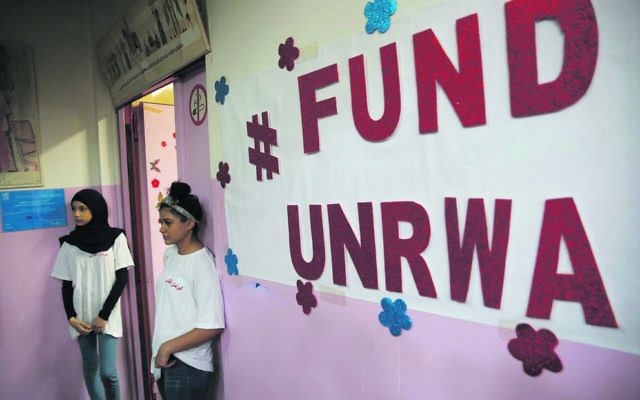Israel pleased as US cuts UNRWA funding
There is dismay in the international community but delight in Israel, after America ended a funding to the UN’s agency for Palestinian refugees.

THERE is dismay in the international community but delight in Israel, after America ended a funding to the UN’s agency for Palestinian refugees.
UNRWA is seething, and accusing America of the “politicisation” of humanitarian aid, but Israel disagrees. According to Jerusalem, UNRWA has been playing politics with Palestinian refugees for decades.
“The US has done a very important thing by halting the financing for the refugee perpetuation agency known as UNRWA,” said Israel’s Prime Minister Benjamin Netanyahu.
The agency was created “not to absorb the refugees but to perpetuate them,” so by removing funding, America is “finally beginning to resolve the problem,” said Netanyahu.
The funding cut means that UNRWA will lose around US$350 million a year, which is around a quarter of its budget.
David Bedein, director of a Jerusalem-based think tank that has long criticised UNRWA told The AJN, “It’s a step in the right direction and the key will be if other countries follow suit, as it won’t have the right impact if other countries continue to give without conditions.”
Bedein, whose Centre for Near East Policy Research has passed its reports on UNRWA to the White House, said that he thinks Australia is one of the countries most likely to follow America’s lead.
There was support for America’s move on the Knesset opposition benches as well as in government.
“UNRWA lost sight of its purpose long ago,” claimed Yair Lapid, leader of Yesh Atid. Many long-time critics of the agency focussed on claims that its buildings have allegedly been used for terror activities, and that its schools allegedly fail to teach a message of peace and instead teach hard-line Palestinian positions.
The “only hope” that UNRWA has provided Palestinians, said activist and former Knesset member Einat Wilf, is “hope that Israel will one day disappear.”
Netanyahu made his comments about UNRWA in Yad Binyamin, a town selected because it absorbed many Israelis who were evacuated from Gaza in 2005. Netanyahu was making an argument that Israel gets people back to normal after upheaval while UNRWA keeps people in limbo.
He spoke about Israel’s absorption of Holocaust survivors post-war. “Did we leave them as refugees? No, we absorbed them,” he said, adding that Israel also absorbed Jews who were forced out of Arab countries in the 1940s and 1950s.
“They were uprooted, from the same war, the War of Liberation. Hundreds of thousands of Jews who came here as refugees without anything; they left all their property behind.”
There were hopes in Jerusalem that the White House would formally reject the United Nations definition of Palestinian refugees, which passes refugee status from generation to generation, and keep people refugees even if they become citizens of a state. But an official at the State Department said that this definition isn’t being changed even though it is “not appropriate or sustainable.”
Announcing the end to UNRWA funding, State Department spokeswoman Heather Nauert said that the agency is an “irredeemably flawed operation.” She said: “Palestinians, wherever they live, deserve better than an endlessly crisis-driven service provision model. They deserve to be able to plan for the future.”
Pierre Krähenbühl, UNRWA Commissioner-General, hit out at America and Israel in an open letter to refugees. He argued that the “protracted nature of the Palestine refugee-hood” is the fault of “he parties and in the international community’s lack of will or utter inability to bring about a negotiated and peaceful resolution.” He claimed: “The attempt to make UNRWA somehow responsible for perpetuating the crisis is disingenuous at best.”
Many in American politics and diplomacy were critical. Samantha Power, former US ambassador to the UN, argued that despite UNRWA’s “shortcomings” it is a “critical source of stability” and the “reckless decision that will be devastating for civilians.”
Nabil Abu Rudeineh, spokesman for the Palestinian President Mahmoud Abbas called the America decision “an attack on the rights of the Palestinian people,” and said he is considering objecting at the United Nations General Assembly and the Security Council.
NATHAN JEFFAY

comments